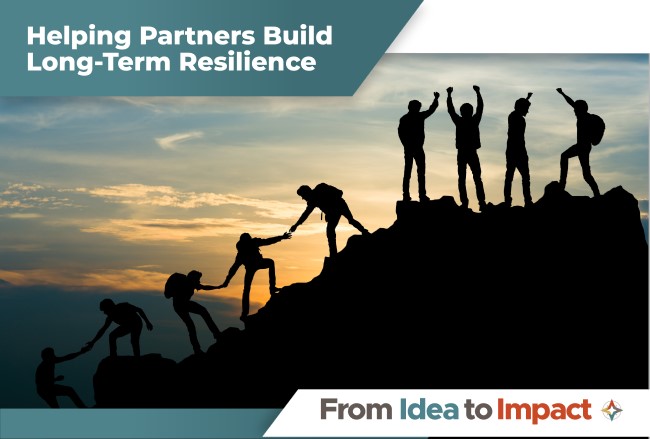Helping Partners Build Long-Term Resilience

In the context of a global pandemic, deep economic uncertainties, and significant social unrest, funders are currently grappling with numerous unknowns. This much, however, is abundantly clear: Many of our nonprofit partners will need significant additional support to weather the current storm. As others have argued, providing more funding with fewer restrictions is one of the most essential ways for funders to support their partners at this time, as is accelerating grant cycles and easing reporting requirements. But this time of crisis will also require unprecedented adaptation and organizational capacities that nonprofit partners have, in many cases, never been asked or funded to build. Without thoughtful investment and support to bolster such capacities, many organizations will be at significant risk over the coming weeks and months.
As we work side-by-side with funders and their grantees, we are seeing a few specific and pointed capabilities and skill sets that organizations will need to survive, emerge stronger, and advance a more equitable sector and world.
- Nimble strategic planning and response processes: Gone are the days of the three- to five-year plan—what organizations need now is an ability to land on ways to advance their mission in times of extraordinary challenge and uncertainty. Doing so requires sound decision-making processes, an ability to identify paths to scale down if necessary, and capable and decisive leadership. Scenario planning is a tool many are turning to to help them facilitate these nimble processes.
- Stronger feedback loops with communities: Nonprofit organizations are, in general, much better equipped and positioned than their funders to integrate equity into their missions, programs, and operations. However, given the depths of the challenges related to racial equity in our country and the glaring inequity of the impacts of COVID-19 on diverse populations, many organizations will need to create additional time and space to invest even more in listening to communities and adapting based on what they learn. While the benefit to the organizations here is critical, there is also a clear benefit to funders: there is so much the philanthropy community can learn from nonprofit partners about how to most effectively serve diverse populations, how to hire and retain a diverse staff, and more.
- Financial planning: Related to #1 above, organizations will need to formulate sound forecasts, build new budget scenarios, get a real-time read on expenses, and monitor cash flow in a way that may stretch beyond the current skill sets or normal operations of their financial teams—especially if they are facing staffing limitations due to COVID-19.
- Change management: Most organizations will experience significant disruption and change. They will need to support their staff members and, depending on their mission, their communities, as they chart the best path forward. Communicating decisions and guiding teams through these changes is an art and one that grantees may find best supported with the help of partners.
- Technology use: With social distancing practices sticking around for the near and medium term, organizations will need to use technology in new ways to connect with their communities, deliver services, and collaborate with partners—not to mention for their own staff members and teams to function. This has been challenging for even the best-resourced companies, and grantees will need grant dollars and technical partners to help them build and sustain these capabilities.
- Workforce planning: Some grantees will also need to think in both the short and long term about the optimal structure for their workforce. Reduced funding may require them to do more with fewer staff members. They may no longer need some functions while they will see the demand for others grow. Finally, COVID’s direct impact on their workforces—due to illness or absenteeism related to child care and family responsibilities—may require significant shifts to how organizations structure teams and reveal key-person dependencies that need solving for. These myriad factors will require nimble organizational (re)design skills and strong human resource capabilities.
Unfortunately, nonprofit organizations often have to underinvest in their own structures, operations, and internal teams (i.e., teams other than program and fundraising). The prevailing approach to nonprofit funding frequently traps them in a starvation cycle, preventing them from investing in their own capacity to adapt to change, grow, and build upon hard-won knowledge and lived experience.
While it will always be important for funders to support delivery of effective and impactful programs, the field cannot afford to ignore the infrastructure supports and investments that will allow organizations not only to survive in the current crisis but to thrive in the long term. Even as funders continue to step forward to support emergency needs, they should look for ways to support nonprofit partners as we all adapt and prepare for a future we have just begun to anticipate.
Gwen Walden is a senior managing director in Arabella’s San Francisco office, where she leads the firm’s West Coast practice. With more than 25 years of leadership experience in the nonprofit sector, her career encompasses major programmatic, management, and executive leadership roles and is marked by her encyclopedic knowledge of the history and practice of philanthropy and her hands-on experience managing major foundation initiatives and functions.
Melanie Torres, a managing director at Arabella, leads the firm’s client innovation and strategic planning efforts. In this role, she works across the firm’s leadership team and portfolio of projects to identify and build new service capabilities to better serve the philanthropy and impact investing sectors.
